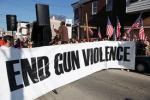How many Americans own guns? The answer to this question is probably the single, most important piece of data for both sides of the gun debate. If the number of Americans who own guns is increasing, then arguments for gun control will be accepted by fewer and fewer people every year. However, if fewer people turn out to be gun owners, then efforts to push new gun control legislation will run up against less resistance over time. Either way, figuring out the actual number of people who own guns is difficult because very few jurisdictions actually require that every individual gun owner register his or her guns. So we are forced to fall back on various surveys or polls, which always leave room for doubt because, by definition, the results of any public survey can be interpreted in more than one way.
The latest example of how a survey of the number of gun owners can be looked at from two very different perspectives are the reactions to the latest General Social Survey conducted by the AP-NORC Center at the University of Chicago and published every two years. The survey asks many questions that have been unchanged since 1972, it is based on interviews with 2,500 respondents, and it is generally considered the most reliable indicator of American socio-political attitudes and how these attitudes change over time.
The GSS has been asking the following question since 1972: “Do you happen to have in your home or garage any guns or revolvers?” Since the question was first asked in 1972, when the overall response was roughly 50%, the number of positive responses has been slowly but surely going down. It’s higher in households who declare themselves to be Republicans as opposed to Democrats or Independents, but in all three groups, notwithstanding a brief Obama-provoked increase among Republican respondents between 2008 and 2012, the overall number keeps edging South, with the high watermark of 53% reached in 1978 and the 2014 figure sliding to its current 32%.
This part of the report, as you can imagine, came in for its share of positive versus negative press depending on the general attitude towards guns. The Violence Policy Center issued a very detailed analysis of the findings, and announced that the shrinkage of American gun ownership was an “unavoidable conclusion” of the GSS survey, reflecting “the aging of the current-gun owning population, primarily white males, and a lack of interest in guns by youth.” The NRA, on the other hand, touts a Gallup survey which showed household gun ownership at 42%, although they neglect to mention that this number has also dropped nearly 10 points since 1994.
I happen to think that the GSS findings are probably accurate for three reasons. First, the GSS develops its data based on in-person interviews, rather than telephone contacts, and the in-depth questioning of each respondent tends to make it easier for the post-interview analysts to differentiate between valid, as opposed to questionable responses received by the survey teams in the field. Second, while the specific numbers on gun ownership between GSS versus Gallup may differ, the trends over time are the same. Finally, I am at a loss to understand why the pro-gun community still believes that gun owners are afraid to disclose their ownership of guns, which continues to be the nonsensical, knee-jerk response to every survey that points to Americans losing interest in guns.
If the NRA is still convinced that gun owners tend to be afraid of disclosing their ownership of guns, why don’t they conduct a study like the one conducted by the head of the GSS, Tom Smith, who found in a 2001 survey of 800 CCW-holders that 90% admitted to owning guns. This study was conducted, incidentally, to eliminate the possibility that the GSS data was based on too many false-negative responses, which it turned out wasn’t true. Instead of theories, opinions and random selection of data, I’d love to see the pro-gun folks just once produce a serious survey to back up their own claims – just once.


Recent Comments